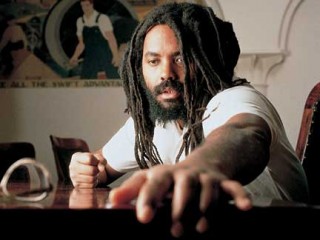
Mumia Abu-Jamal biography
Date of birth : 1954-04-24
Date of death : -
Birthplace : Philadelphia, Pennsylvania, United States
Nationality : American
Category : Famous Figures
Last modified : 2010-07-15
Credited as : Journalist, activist,
0 votes so far
The case of Mumia Abu-Jamal has garnered international attention. Abu-Jamal has been on death row since his arrest in 1981 for the murder of Philadelphia police officer Daniel Faulkner. A political journalist and activist, he maintains his innocence, and has publicized his plight and that of other death-row inmates through controversial radio broadcasts and in his 1995 book Live from Death Row. Human rights groups such as Amnesty International and intellectuals including Alice Walker have rallied to Abu-Jamal's cause.
Early Work
Mumia Abu-Jamal was born Wesley Cook on April 24, 1954, in Philadelphia. He began his life as an activist early. When he was fourteen, he participated in a protest at a presidential rally for George Wallace and was beaten and arrested. He was a founding member of the Philadelphia chapter of the Black Panthers in 1968, and he worked for the party newspaper in California in 1970.
Returning to Philadelphia, Abu-Jamal was from 1970 to 1981 an award-winning radio announcer with the Corporation for Public Broadcasting. During this time, he was a vocal critic of the Philadelphia Police Department, alleging its brutality against African Americans, and of Mayor Rizzo's Administration's suppression of MOVE, an African American political organization that was ransacked in 1978 by police officers.
Impact
On July 2, 1982, Abu-Jamal was sentenced to death for the murder of Philadelphia police officer Daniel Faulkner. The previous year, while moonlighting as a cab driver, he had pulled over to investigate an altercation between his brother, William Cook, and Faulkner. According to Abu-Jamal, Faulkner was beating Cook, and someone in a crowd that gathered shot the officer. Abu-Jamal himself was shot in the chest during the incident. The prosecution, however, maintains that Abu-Jamal shot Faulkner in the back and in the face.
Many complications have surrounded the evidence in the trial. Abu-Jamal's licensed .38 caliber pistol was found at the scene of the crime; but subsequent ballistic evidence showed that a fatal head wound in Faulkner came from a .44. Two of the prosecution's witnesses have since recanted their testimonies, claiming that Philadelphia police coerced them into testifying against Abu-Jamal. One of the key witnesses was not recognized by others and may not have been at the scene as she claimed. Two other witnesses, who claimed to have heard Abu-Jamal confess to the crime in the hospital, turned out to have been friends of Faulkner. Police never investigated the possibility of another shooter. A further complication is that Cook, who has been said to have a history of drug problems, has never testified for his brother.
Abu-Jamal has never testified in his own defense and was absent for many parts of his trial. He originally chose to represent himself, but was finally appointed a reportedly unsympathetic lawyer by Albert Sabo, the presiding judge, well-known for handing out numerous death sentences. Abu-Jamal's current lawyers, including Leonard Weinglass, are more involved with the case and are funded by several defense committees. Their client, who was originally scheduled to be executed on August 17, 1995, is presently petitioning for a new trial.
The case of Mumia Abu-Jamal has garnered widespread international attention. Writers and intellectuals, including E.L. Doctorow and Alice Walker, have spoken in support of him; although other intellectuals, including Adolph Reed, have criticized his tactics. Amnesty International and other human rights organizations have voiced their concern over the trial and over Abu-Jamal's subsequent treatment in prison, and newspapers and magazines across the United States continue to publish lively debates about Abu-Jamal and his attempts to broadcast his journalism from prison.
CAREER
From prison, Abu-Jamal has continued to write. He has published many articles as well as a book, Live From Death Row, in which he details his and other inmates' treatment in prison, and presents evidence suggesting that African Americans are disproportionately handed the death sentence. Additionally, Abu-Jamal brought a censorship suit against National Public Radio in 1996 after the organization canceled his scheduled commentaries under pressure from Faulkner's widow, Philadelphia police, and others. Similarly, in 1997, a dozen radio stations dropped Pacifica Radio's programming when they heard it was to include thirteen of Abu-Jamal's commentaries. Abu-Jamal continues to write from death row, and his First Amendment rights are a subject of continued debate among journalists and legal scholars.
















